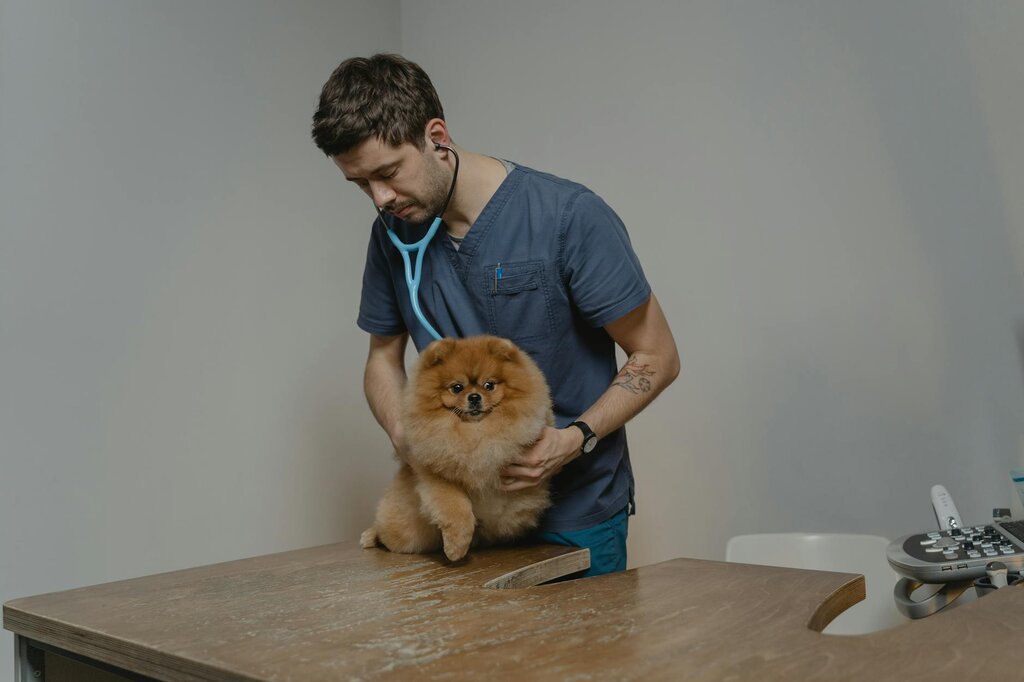Last Updated: 06/01/2026
Tracheal Collapse in Dogs
Has your dog been diagnosed with a collapsing trachea? Find out all about the causes diagnosis and treatment in our Vet guide.
Author: Dr Samantha Wycherley BVSc
Reading Time: 2 minutes - short read
Has your dog developed a cough? Did your vet mention a collapsing trachea and you're looking to learn a little more? Or perhaps you have a breed predisposed to a collapsing trachea? The most common questions have been answered below.
What is Tracheal Collapse in Dogs?

Tracheal collapse is a disease of the trachea (windpipe). The trachea is made up of small rings of cartilage that help to hold it open when an animal is breathing.
In some dogs the cartilage will become weak and over time this can cause the trachea to collapse.
Signs of Tracheal Collapse
The most common sign which owners report is a cough that sounds a little like a goose honking.
Often this cough will be elicited when a dog is pulling on their collar or when they are excited.
More serious symptoms that can be seen include fainting or difficulty breathing.
Most Common Breeds to Have Tracheal Collapse

Collapsing trachea is mainly seen in small breed dogs. The breeds that are the most commonly affected are Yorkshire Terriers, Pomeranians, chihuahuas and poodles.Dogs are typically middle aged or older when they start showing signs.
Diagnosis of Tracheal Collapse

Many dogs that present with coughing will have chest x-rays recommended.
Chest x-rays are very useful for ruling out other causes of coughing however its important to note that tracheal collapse is not always able to be diagnosed on chest x-rays. As tracheal collapse is a dynamic disease (the airway narrows at certain times) the x-ray has to catch the exact moment the narrowing is visible.
Fluoroscopy is another diagnostic imaging tool - this is a moving x-ray. This type of imaging is usually offered in referral practices.
Endoscopy is a great way to diagnose a collapsing trachea and often this can be done in general practice. A camera is used to view the inside of the trachea. This needs to be done under a general anaesthetic.
Treatment of Tracheal Collapse

Unfortunately, a collapsing trachea is an irreversible condition, however most cases of collapsing trachea are able to be managed medically.
Medical management often includes medications to help suppress coughing and to reduce inflammation in the airway.
It has been found that dogs that are overweight tend to have more severe symptoms therefore maintaining a healthy weight is imperative for dogs diagnosed with tracheal collapse.
Some weight management dog foods for small breeds are listed below.
For dogs with tracheal collapse it is advised to not use a neck collar for walking. A front-attaching or padded harness ensures no direct pressure is applied to the sensitive windpipe.
For more severe cases there are surgical options available. Surgery involves placing a stent in the trachea to keep it held open - this surgery is performed by a specialist vet surgeon and does have risks involved.
Weight Loss Diets for Small Breed Dogs
While a diagnosis of tracheal collapse can feel overwhelming, most dogs go on to live very happy, comfortable lives with the right management. Things to ensure are to focus on a healthy weight, swapping the collar for a harness, and monitoring symptoms regularly with the vet.
Articles recommended for you
Our vet authored guide to the benefits of feeding your dog fresh food plus tips and advice for introducing it into their regular menu.
See our guide to protecting your pet from parasites from our vet team.
Thinking of getting a fish? Check out our guide for setting up a tank and home care tips!
Looking to understand horse feeds better? This comprehensive guide covers feeding recommendations for horses of all ages and disciplines.
Does your pet suffer from anxiety? Check out our Vet-guide for treatment options to help your pet.
History
Our experts continually monitor the health and wellness space and we update our articles when new information becomes available.
Thurs Feb 9 2023
Written by Dr Samantha Wycherley BVScDr Samantha Wycherley BVSc
Contributing Author, BVSc
Dr Samantha works as a companion animal veterinarian in Melbourne. Graduated from Massey University in New Zealand in 2015. I have worked in NZ, across the UK and in Australia. Special interests include wildlife and senior pet medicine.

